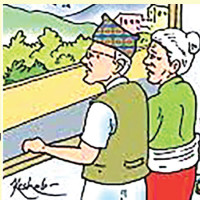- Saturday, 28 February 2026
Democracy And Civic Consciousness
Nepal, a country with about 30 million people, is a democratic and sovereign state. It has gone beyond the governance and constitutional monarchy stages. Despite that, we have suffered bitterly to move away from those systems at the expense of our blood through internal wars and chaos—everything inhumane. It is due to this kind of democracy that, after reaching such an age, we are able to get our own constitution, innumerable infrastructure projects besides civil policies, and so on. The main turning points in the political structure of Nepal are said to be two revolutions: 2046 BS and 2063/63 BS. After World War II, the practice of democracy became global, and Nepal too gained a democratic government for the first time about 73 years ago. Some people still believe that it is not correct to implement a democratic state such as Nepal. The main question regarding the above statement is the literacy rate. Though the literacy rate has risen to around 76 per cent recently, people's consciousness about democracy is still low. Countries like the US and UK claim that their normal people need not know everything regarding their political environment and government because they have evolved way too far to be respectful regarding systems and people.
But for a country like Nepal, it is still an issue to be concerned about. Though we got democracy 73 years ago for the first time, it has always been a concern to protect democracy rather than practice it. Because just after a decade of getting democracy, we faced an autocratic coup, which lasted almost 30 years. After that, we faced an internal chaotic war from 2052 to 2063 BS, which was a disaster. Then, after facing all this chaos, we got to practice free democracy just about 15 years ago. So, we can still say that it’s a new practice for us. Instability has risen so far that we have not yet seen the government last for 5 years. People's concerns are still an issue. Basically, democracy gives us the power to get rid of those negative interferences in government through the medium of elections, which have been taking place almost regularly after 5 years. People's unconsciousness regarding selections has been a problem since we practiced democracy.
Liberty is the most precious gift that democracy offers to a country. The theoretical definition of democracy claims that there will be sustainable peace if there is democracy. But as everyone does, Nepal also has a system to run the administration of the country. If utilised properly, that system is the backbone of a country. But misuse of the system in a democracy leads a country into darkness. Internal diplomacy has been hollow regarding everything because the intellectual power of the people in power seems to be insufficient.
Geopolitically, Nepal is widely recognised as a vulnerable nation. We are encircled not just by two of the world's largest countries in terms of size but also by major players in global politics. Interference is common, occasionally exceeding acceptable limits. In practical terms, our country's diplomatic influence in international affairs is relatively modest. The two neighbouring giants and some distant major players pursue their own interests in our geography. In fact, here we see these two neighbouring countries almost competing with one another—either providing assistance to Nepal or undertaking major projects within our borders as a form of aid. Speculatively, the situation of Nepal’s geopolitics would have been different if it were located somewhere else, thus providing us with information regarding our global standing and relations.
Civic consciousness is always important for the betterment of a country. There are a lot of issues that can be solved just by raising civic consciousness. Selecting a good government is the main one of them, because once we select the wrong ones for handling the system, there is not even a loophole for a minimum of 5 years to correct our mistake. Civic consciousness can also improve the standards, peace of the state, and personality of individuals.
One other important problem arising in Nepal is the involvement of foreign organisations and NGOs. Although not all of them, some seem to have a personal interest in our nation. By labelling themselves NGOs, they take advantage of a legal gap that allows them to operate without the blessing of their home countries and blindly follow their missions at any price. But it is hard for them to go unnoticed as society becomes more civilised.
Patriotism is closely related to civic consciousness. Today, many people dream of leaving Nepal. However, with the election of an efficient government that can govern the country well and protect our independence from meddling, there would be no necessity to go. This would bring peace, a promising future, and plenty of job opportunities to come here. Regrettably, owing to the lack of civic awareness, the discourse on leaving Nepal is too focused, as no one knows what actions ought to be taken.
It's important for people to understand how democracy works. Higher authorities should implement provisions to educate the public on civic consciousness through various channels, such as media and awareness programmes. Additionally, integrating these topics into the educational syllabus is the most effective way to underscore their importance. This approach ensures that these aspects become ingrained in individuals' subconscious minds, facilitating their implementation in practice.
(The writer is pursuing higher education.)









-original-thumb.jpg)





